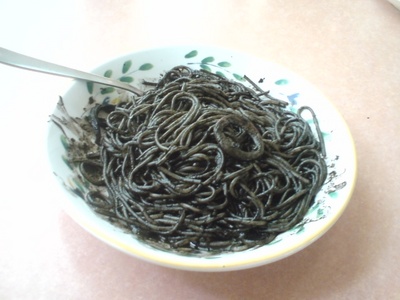Category: General
Bad Words
Last weekend, like most weekends, Tony sat in my lap while playing Counter Strike on my PC. This is our bonding time. I use it to teach him new words and phrases in English, and when he play CS he seems to think in English more than usual.
I asked him, “Do you know any bad words in English?” He thought for a second and exclaimed, “Dingleberry!” He likes that word a lot, but I told him it’s not that bad. So I asked if he knew any words that would get him smacked if he said them in front of Baba (my mother.) The best he could muster was “Fat girl.”
It makes me proud of myself to realize that for the past 10 years I have been so patient and careful of a father that I’ve never cursed in front of or at my kids. I’ve never lost my temper when they leave on every goddamn light in the house, I’ve never threated to kick their asses for goofing off when they’re supposed to be getting ready for bed, and I watch my language when I’m playing video games with them. But once they hit their teens and start really screwing up, I wonder how long I’ll be able to keep their ears safe.
How many kanji do you need to know?
There are a number of official lists of kanji. I’m not an expert by any means, I’m just going by information gleamed off the net.
- 教育漢字(kyouiku kanji): The 1oo6 characters students must learn by grade 6. Essentially, knowing these characters is a good start, but you’re far from finished.
- 当用漢字(touyou kanji): A list of 1850 characters published first in 1946 approved for use in public documents and the media. Many characters that were in use until then were simplified; for example, 學 became 学.
- 常用漢字(jouyou kanji): Last updated in 1981 and the successor of touyou kanji, 1945 characters that basically you ought to know as a literate adult. Used in legal and public documents, newspapers, magazines and broadcast media.
- 新聞漢字表(shimbun kanji hyou): A standard agreed upon among newspapers based on jouyou kanji, but removing some characters and adding others. The link is to a Japanese Wikipedia article, but the explanation and outline that appears there is possibly under copyright and could be deleted from the site in the future.
- 人名用漢字(jin meiyou kanji): Characters approved for use in people’s names. As of 2004, when the government had a heck of a time trying to update the list, there are 983 extra characters than can be used in addition to what’s already in the jouyou kanji list, or that are variants of jouyou characters, and most of them are really, really hard to read. The only way I’ll ever learn them is if I get a chip implanted in my brain someday.
Incidentally, mainland China also simplified their characters sometime after WWII but for obvious reasons they didn’t give a rat’s ass about how Japan went about doing the same thing, so in many cases the two countries simplified the same characters but in different ways.
Summing up, if you’re pretty smart, my guess is that you know around 3,000 characters or more. Multiply that number by a few factors to approximate how many readings you’d need to know for all those characters.
As for me, when reading a novel in Japanese I have to look up an average of five characters per page, and I can get through around 15 pages in 2-3 hours when I’m reading to learn. It’s tedious, frustrating, labor intensive, tiring, and makes me feel learning disabled, which is why I avoided serious studying for far too many years.
Guy hoping to die hits taxi driver with hammer
Early this morning a 31 year old unemployed man sneaked up behind a 41 year old taxi driver taking a wizz in a public toilet at a shrine in Shinjuku and whacked him in the head a few times with a hammer. Two guys passing by heard the driver’s screams and held the attacker until the police arrived. The attacker said he wanted to die, and figured if he killed somebody he’d get the death penalty. Luckily the victim wasn’t seriously injured. Must not have been a sledge hammer.
Link
Drunk guy falls off Yokohama Bay Bridge
A 40-something year old guy riding in a taxi last night told the driver he was going to be sick and had to get out of the car while they were driving over Yokohama Bay bridge. He fell off. Authorities don’t know who he was and haven’t recovered a body.
Link
It’s random news week!
The reason I haven’t been updating this here blog so often lately is because I’m spending all my free time reading and trying to learn as much Japanese as anyone who’s lived here as long as I have ought to know already. I’ve been here nearly half my life, I just turned 40 and my preteen kids read and write better than I can. I’ve slacked off for far too long.
So this week, and maybe from now on, I’m going to paraphrase news articles I read in Japanese and provide a link to the original for anyone who wants to read along. I’m not going to make any attempt whatsoever to use high-falootin’ words or accurately translate articles.
A post from my Japanese blog
And no, I won’t tell you where it is. It’s super-secret.
Every time I see a woman doing her makeup on the train, I wish I could pull a battery-operated shaver out of my pocket and do my face. That’s an old joke, isn’t it. But today I really did forget to shave.
It got laughs.
I wonder if anyone has ever been seriously injured while doing their makeup on a train. Seems like there’s a strong possibility of poking out an eye with a mascara brush or choking to death on lipstick. Wouldn’t that be fun to watch. How much do you want to bet that nobody would help.
Happy National Hugging Day (Jan 21)
By far, the best thing about having kids is the hugs. It more than makes up for the all the lights left on, the water pitchers and ice cube trays left empty, and the pee left on toilet seats.


